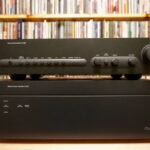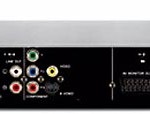 Music downloads, specifically from Apple Computer’s iTunes Music Store,
Music downloads, specifically from Apple Computer’s iTunes Music Store,
have gotten all of the press in terms of music sales in the past five
years. Apple has been able to harness the naughty consumer excitement
behind stealing music from the likes of Napster and Limewire, resulting
in not just the sale of zillions of their sexy and convenient iPods to
the masses, but also millions upon millions of legitimate DRM (digital
rights managed) music files. The impact on the surface has been so
powerful that users of both Mac and PCs use Apple’s system as an easy,
powerful and convenient way to buy music. Apple’s success as both a
hardware and software provider has been so impactful that music
retailers, ranging from independent yet prominent stores like Aaron’s
Records to content-minded chains like Tower Records, are now nothing
but a bankrupt memory.
As an avid collector of music
since I got my first-generation Sony Discman when I was 10 years old, I
must say I am amazed that people are as in love with buying songs by
the download as they are. Yes, the process is convenient but the value
simply stinks compared to buying used CDs. While your local music
retailer may have been recently converted to a Kinko’s or a Starbucks,
you still can buy CDs online and you can buy them used. My current MP3
collection of songs ripped from my CD collection both past and present
is about 88,000 songs. Amazingly, I find there are things missing and I
am easily able to add them in at prices that make downloads look silly.
I realized I was missing a copy of Van Halen’s very under-rated Diver
Down cover album. I was able to pick one up used from Amazon for $2.99,
plus a nominal fee for shipping. The disc arrived in good shape and I
ripped it for use on my iPod and then ripped it onto my ReQuest Audio
music server at home in a lossless format for use in my reference
theater, as well as in my distributed audio system. I added “Little
Guitars” to my Guitar Heroes playlist for hopeless play-along sessions
and then parked the CD in my media storage case for future use. I got
all of this value for about $3.50, when downloading all of the 12 songs
from iTunes would have cost me $0.99 each or $9.99 for the entire
record. This includes me owning the disc with no DRM on it, being able
to rip it lossless, as well as in lossy formats for my MP3 device, all
at one-third the price of a downloaded, copy-protected record from
Apple.
If I wanted to recycle the title, I could even sell the CD on eBay or
Amazon and use the capital to buy something else. For me personally,
listing the record for sale isn’t worth the time it would take me to do
it. For others looking to ramp up their feedback on eBay, this is an
easy way to get a pretty impressive resume of feedback, which provides
yet another reason to consider the practice. Also, hard drives
sometimes fail and God forbid you need to re-rip your collection – it’s
nice to know that even if they are all stashed away in a few of those
book-like cases that you can recreate your collection if needed.
You can do the same used disc-purchasing maneuver with DVD movies, but
the management of the content is a bit trickier. The ripping of movies
takes more time than ripping music CDs and requires much more hard
drive space. Terabyte hard drives now cost under $1,000 and something
like Apple TV makes management of your content pretty easy, despite the
investment being a little bigger. The chance of losing some of the
supplemental materials or alternate surround soundtracks is also a
problem. But if you have a media center PC or one of the growing list
of video-based server components like Kalidescape, this practice could
really build your collection at an affordable price.
While I normally promote the purchase of new gear and software at
retail prices, the need for the music industry and Hollywood to
continue to push the technological envelope to get us all back out to
the retail stores to re-purchase our collections remains pressing. The
music industry screwed up SACD and DVD-Audio so badly it is shameful,
but what is worse, they are doing nothing yet with HD DVD and or
Blu-ray to tempt consumers who care about and are willing to invest in
music to buy their back catalogue again. Hollywood studios are doing a
far better job by releasing movies on HD DVD and or Blu-ray, but so few
great titles are on the street at this point that it is amazing. In
many cases, the titles that are coming to market are old transfers of
movies without the whiz-bang effects and stunning modern cinematography
that you want to see in 1080p video and hear in 7.1 surround. Selling
against the hundreds of millions of DVDs and CDs on the market will
prove to be a worthy reason for both Hollywood and the major labels to
stay on the cutting edge with their software technology and title
releases.






